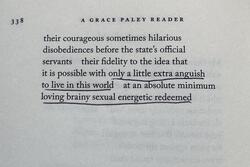How I Became a Slam Poet
The development of my voice can be distilled into three objects: my wrists, a scrap of paper, and a stage. It is with these objects that I have questioned, shouted, and pondered the world around me as someone with a female voice.
It has been proven that lower, more masculine-sounding voices are given more respect than higher, feminine-sounding voices… but I didn’t need a study to tell me this. I learned to speak late and thus became an avid observer of the world around me. I saw women being talked over, interrupted, and ignored. Maybe it was these observations I’d made even before I knew the word “patriarchy” that prompted me to learn sign language before ever speaking a word aloud. It was with my swerving wrists that I strung together my first sentence as my mother carried me through the busy streets of Boston: “I hear the cat.” Even then I made sure to listen in for the softer noises.
Finally, I developed my speech and soon experienced the reality of expressing myself with a soft voice. At an elementary school lunch table, I was never able to finish my stories about daredevil climbs on the monkey bars or crazy ballet recital mishaps. When complaining to my mother about it, I quickly became an annoyance and was sent to my room.
This brings us to the scraps of paper. Soon after learning to spell, I adopted a new form of expression: the note. If I’d made my mother angry, rather than trying to argue my way out of the situation, I simply slipped a scrap of paper under her door reading: “I’m sorry, Mom. I love you so much! Can I have a hug?” It worked like magic every time. Then, in order to rant about the day's mishaps, I’d turn to the only person I could talk to who never interrupted me: my journal. Thus, I became a writer.
Journal pages overflowed as I explored my own voice in the safety of a piece of paper. It wasn’t until I was 14 years old that I began to share my words and find a place for my voice to be heard.
The art form of slam poetry brings together the security of writing and the power of a spoken voice in a context that allows for all voices to be listened to equally. This is where I found my stage.
My first poetry slam was in a tiny cafe with a stage that couldn’t have been raised more than six inches off the ground, but nonetheless, it was a stage, and for three minutes it was mine. In a poetry slam, each contestant is given three minutes to perform and infinite time beforehand to prepare. Within my three minutes, I let myself loose. I wrote angry, I wrote loud, I wrote personal, I wrote political (although aren’t those last two the same thing?). These three minutes gave me permission to explore my own voice and take ownership of the power of its sound.
Through slam poetry, I learned to enunciate every syllable as if it’s the most important sound I will ever make. Maybe this is just a saying to make sure my words come out loud and clear but in reality, every sound that a woman makes is revolutionary. We have been silenced for so long that to speak with conviction is to challenge oppression. Maybe we can even shatter some glass ceilings if we shout loud enough.
This piece was written as part of JWA’s Rising Voices Fellowship.







